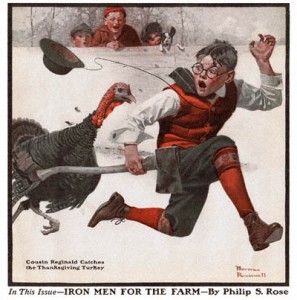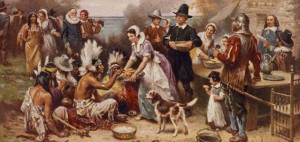 This Thursday we will once again celebrate our national feast day and harvest festival that we call Thanksgiving. It is always an especially meaningful holiday for new England Congregationalists, since they were our forebears. You may recall that the Pilgrims were an offshoot of a branch of English Protestantism called the Puritans. They were so called because they wanted to “purify” the Church of England and purge it of practices for which there was no biblical warrant. They wanted to stay within the church and reform it.
This Thursday we will once again celebrate our national feast day and harvest festival that we call Thanksgiving. It is always an especially meaningful holiday for new England Congregationalists, since they were our forebears. You may recall that the Pilgrims were an offshoot of a branch of English Protestantism called the Puritans. They were so called because they wanted to “purify” the Church of England and purge it of practices for which there was no biblical warrant. They wanted to stay within the church and reform it.
The Pilgrims, however, were separatists and they were also Congregationalists, believing that the bible taught that the local church was autonomous and had sole authority over its members and it affairs. The church was to be a covenant community comprised only of professing believers. The idea of a national church was anathema. What the Pilgrims did was separate from the national church, which in the legal system at the time was an act of high treason. They were thought to be subversive, anarchical, and disloyal—much as we are today. Thus the Puritans began to persecute them vigorously.
In 1609 they fled to Holland. There they suffered greatly under grinding poverty and because they didn’t know the language and lost their livelihoods. Many died and many children became ill and crippled due to the heavy labor they had to endure. Moreover, their children began speaking in Dutch and were losing their English heritage.
They were in despair as to what to do. They couldn’t go back to England and the surely couldn’t stay in Holland. So, one day while hanging around at the kitchen table one Pilgrim looks to another and says, “Hey, what about the Cape?!” “Geeze, do you think we can get anything there this time of year?” So, on September 6, 1620, they set sail to the new world and landed at the Cape on November 11 and finally settled at Plymouth on December 8.
The Indians and the Pilgrims did share the first Thanksgiving in peace and harmony. The Indians were most generous in sharing their agricultural and gaming secrets. I wish I could tell you this was the end of the story and that they all lived happily ever after. But we now know this was not the whole story. When the Pilgrims came to New England, they were not coming to vacant land, but to territory inhabited by the Pequot and Wampanoag Indians. The governor of the Massachusetts Bay Colony, John Winthrop, created the excuse to take Indian land by declaring the area legally a “vacuum.” The Indians, he said, had not “subdued” the land, and therefore had only a “natural” right to it, but not a “civil right.” A “natural right” did not have legal standing. In the next forty years or so, they decimated the Indian populations.
 It’s easy to throw stones with 385 years of hind sight. If anything, it demonstrates the Christian doctrine of sin. The Reformers described Christians as simil justis et pecator—simultaneously justified and a sinner. As image bearers of God who are redeemed by Christ, we still remain sinners and often miss the mark. The Pilgrims certainly had their blind spots and so do we. How will future generations look back on us? What might they ask us? Perhaps, “Why didn’t you guys do anything about global warming?” Or “What was the big deal about homosexuality?” Or “How come you bought so much stuff you didn’t need?”
It’s easy to throw stones with 385 years of hind sight. If anything, it demonstrates the Christian doctrine of sin. The Reformers described Christians as simil justis et pecator—simultaneously justified and a sinner. As image bearers of God who are redeemed by Christ, we still remain sinners and often miss the mark. The Pilgrims certainly had their blind spots and so do we. How will future generations look back on us? What might they ask us? Perhaps, “Why didn’t you guys do anything about global warming?” Or “What was the big deal about homosexuality?” Or “How come you bought so much stuff you didn’t need?”
Perhaps if they had read today’s text in Matthew (Matthew 25: 31-46) a little more closely, they might have seen their Indian brethren and sistren as among “the least of these.” Or, perhaps, that they were the recipients of God’s graciousness at the hands of these native peoples.
